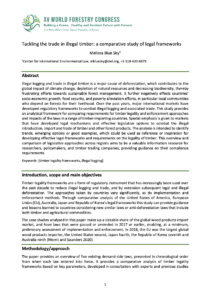Illegal logging and trade in illegal timber is a major cause of deforestation, which contributes to the global impact of climate change, depletion of natural resources, and decreasing biodiversity, thereby frustrating efforts towards sustainable forest management. It further negatively affects countries’ socio-economic growth, food security, and poverty alleviation efforts, in particular local communities who depend on forests for their livelihood.
Over the past years, major international markets have developed regulatory frameworks to
combat illegal logging and associated trade. The study “Tackling the trade in illegal timber: a comparative study of legal frameworks” provides an analytical framework for comparing requirements for timber legality and enforcement approaches and impacts of the laws in a range of timber-importing countries.
Special emphasis is given to markets that have developed legal mechanisms and effective legislative options to combat the illegal introduction, import, and trade of timber and other forest products.
An in-depth analysis of case studies is undertaken to identify trends, emerging options, or good examples, which could be used as a reference or an inspiration for developing effective legal frameworks and requirements on the legality of timber. This accurate overview and comparison of legislative approaches across regions intend to be a valuable information resource for researchers, policymakers, and timber trading companies, providing guidance on their compliance requirements.
The study was presented by CIEL’s Senior Attorney and author Melissa Blue Sky during the World Forestry Congress in May 2022.
Published on May 4th, 2022.

